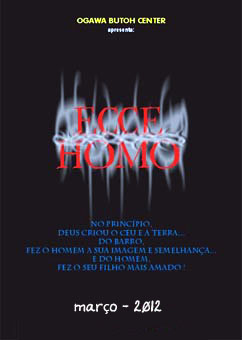"ECCE HOMO"
"O Homem não é um ser finitus, findo, acabado - ele é infinitus, não-findo, não-acabado, porque ele é uma sinfonia inacabada.
O espetáculo é um estudo sobre o tema criação.
" Sozinho vou agora, meus discípulos! Também vós, ide embora, e sozinhos!
Criação e direção: Joao Butoh
Interpretação: Ogawa Butoh Center
Os problemas de uma lagarta não acabam com a lagarta, mas sim com a borboleta, porque a lagarta é uma sinfonia inacabada. A lagarta é a borboleta "infinita", não-finda, por acabar...
Quando mais me aproximo do infinito, menos finito me sinto e mais desperta em mim a consciência do meu ser "infinito", inacabado...
Quanto mais me aproximo da luz, mais largas e espessas são as sombras que projeto após o meu ser, porque mais nítida se torna a consciência da minha finitude...
O teu Infinito, intensifica em mim a consciência da minha finitude - quanto mais te gozo mais te sofro...
Quanto mais te possuo mais te procuro...
Quanto mais me delicio em ti mais fome tenho de ti..."
Partimos do encontro de dois elementos - a terra e a água. Identificamos também a semelhança em aspectos mitológicos relacionando a mitologia de várias civilizações, da criação do mundo e da humanidade. Os quais indicam como fonte de criação/transformação - o barro.
Este elemento também está efetivamente presente no espetáculo, pois os intérpretes, desenvolvem a história de seus personagens, durante todo o tempo imersos, dentro de um tanque com lama até a altura dos joelhos.
Várias referências encontramos relacionada ao tema, mas optamos por dialogar com a cultura popular ocidental, brasileira, caipira e a partir destes discursos, traçamos as etapas em que os intérpretes irão ao encontro do Ecce Homo, segundo Friedrich Nietzsche. O qual incorporamos ao título desta obra.
Assim quero eu.
Afastai-vos de mim e defendei-vos de Zaratustra! E, melhor ainda: envergonhai-vos dele! Talvez vos tenha enganado.
O homem do conhecimento não precisa somente amar seus inimigos, precisa também poder odiar seus amigos.
Paga-se mal a um mestre, quando se continua sempre a ser apenas o aluno.
E por que não quereis arrancar minha coroa de louros?
Vós me venerais, mas, e se um dia vossa veneração desmoronar? Guardai-vos de que não vos esmague uma estátua!
Dizeis que acreditais em Zaratustra? Mas que importa Zaratustra! Sois meus crentes, mas que importam todos os crentes!
Ainda não vos havíeis procurado: então me encontrastes. Assim fazem todos os crentes; por isso importa tão pouco toda crença.
Agora vos mando me perderdes e vos encontrardes; e somente quando me tiverdes todos renegado eu retornarei a vós..."
( Friedrich Nietzsche)


"The Man is not a being finitus, ending, finished - it is infinitus, not-ending, not-finished, because it is an unfinished symphony. The problems of a lizard do not finish with the lizard, but yes with the butterfly, because the lizard is an unfinished symphony. The lizard is "the infinite" butterfly, not-ending, for finishing... When more I come close myself to the infinite, less finite I feel myself and more the conscience of my "infinite" being awakes in me, unfinished... The more me I come close myself to the light, wider and thick they are the shades that project after my being, because clearer if it becomes the conscience of my finitude... Your Infinite, intensifies in me the conscience of my finitude - the more you joy more I suffer to you... The more I possess you more I look for to you... The more I delight in you more hunger I have of you... "
The spectacle is a study on the subject creation. We break of the meeting of two elements - the land and the water. We also identify the similarity in mitologics aspects relating the mythology of some civilizations, the creation of the world and the humanity. Which they indicate as criation/transformation source - the adobe. This element also is effectively present in the spectacle, therefore the interpreters, develops the history of its personages, during all the time immersed, inside of a tank with mud until the height of the knees. Some references we find related to the subject, but we opt to dialoguing with the popular culture occidental person, Brazilian, native and to leave of these speeches, we trace the stages where the interpreters will go to the meeting of the Ecce Homo, according to Friedrich Nietzsche. Which we incorporate the heading of this workmanship.
"Alone I go now, my disciples! Also you, go, and even so alone! Thus I want. You move away from me and you defend you to you of Zaratustra! And, better still: inshame to you of it! Perhaps it has deceived you. The man of the knowledge does not only need to love its enemies, also needs to be able to hate its friends. Paid badly to a master, when he continues yourself always to be only the pupil. And why you do not want to pull out my crown of parrots? You you venerate me, but, and if one day your veneration to pull down? You keep to you of that it does not jam you a statue! You say that you believe Zaratustra? But that it imports Zaratustra! You are my believers, but that the believers import all! Still you had not looked yourselves: then you found me. Thus the believers make all; therefore he imports all belief so little. Now you control to lose me and to meet; e when you will have me all renegate I will only return you... " (Friedrich Nietzsche)
